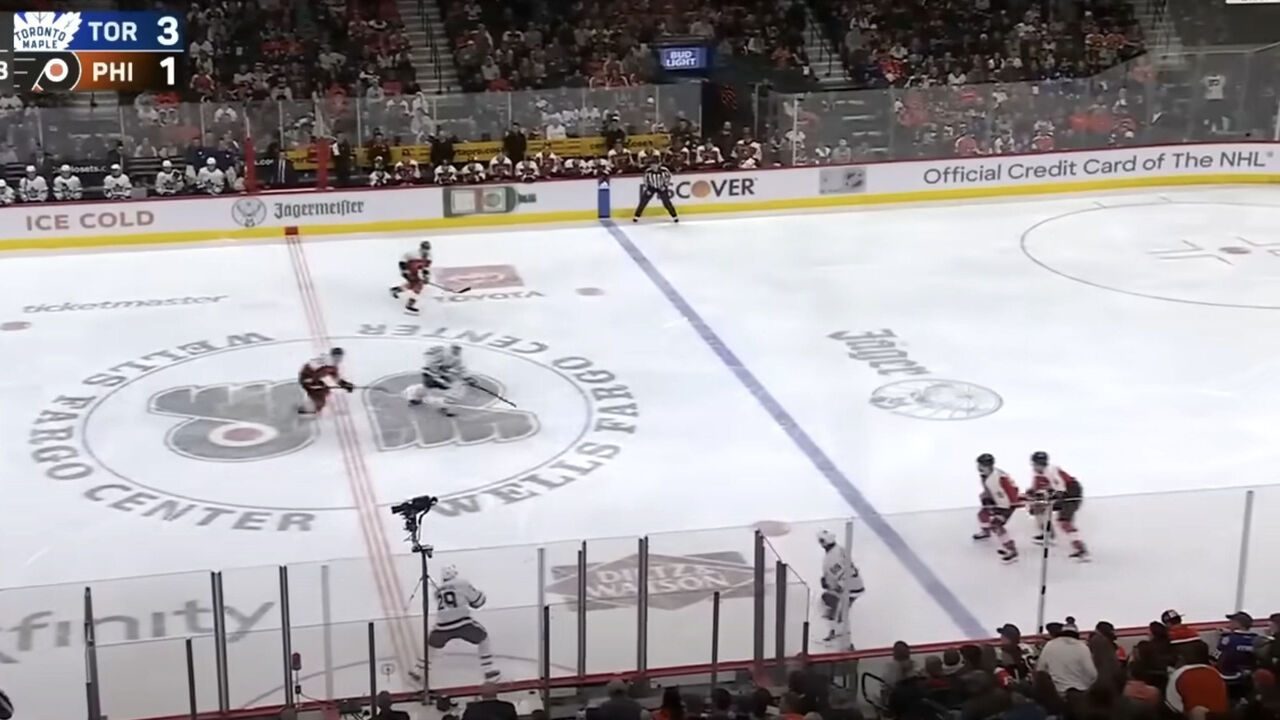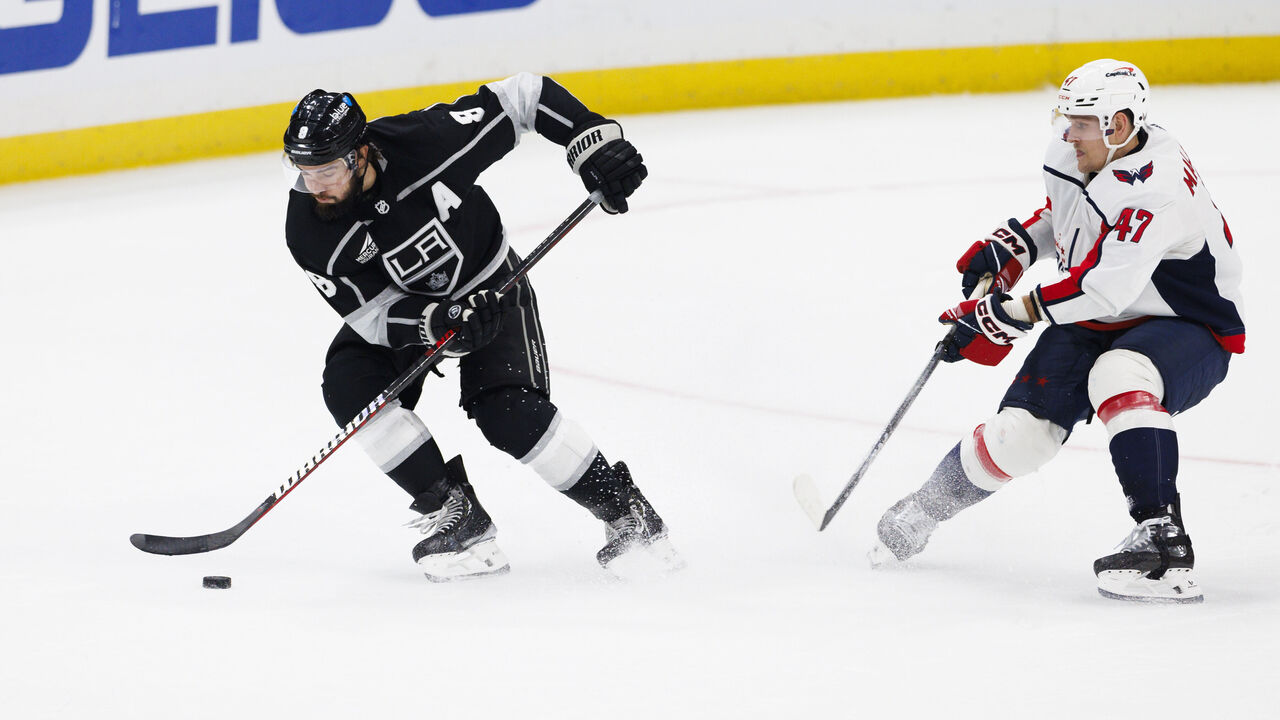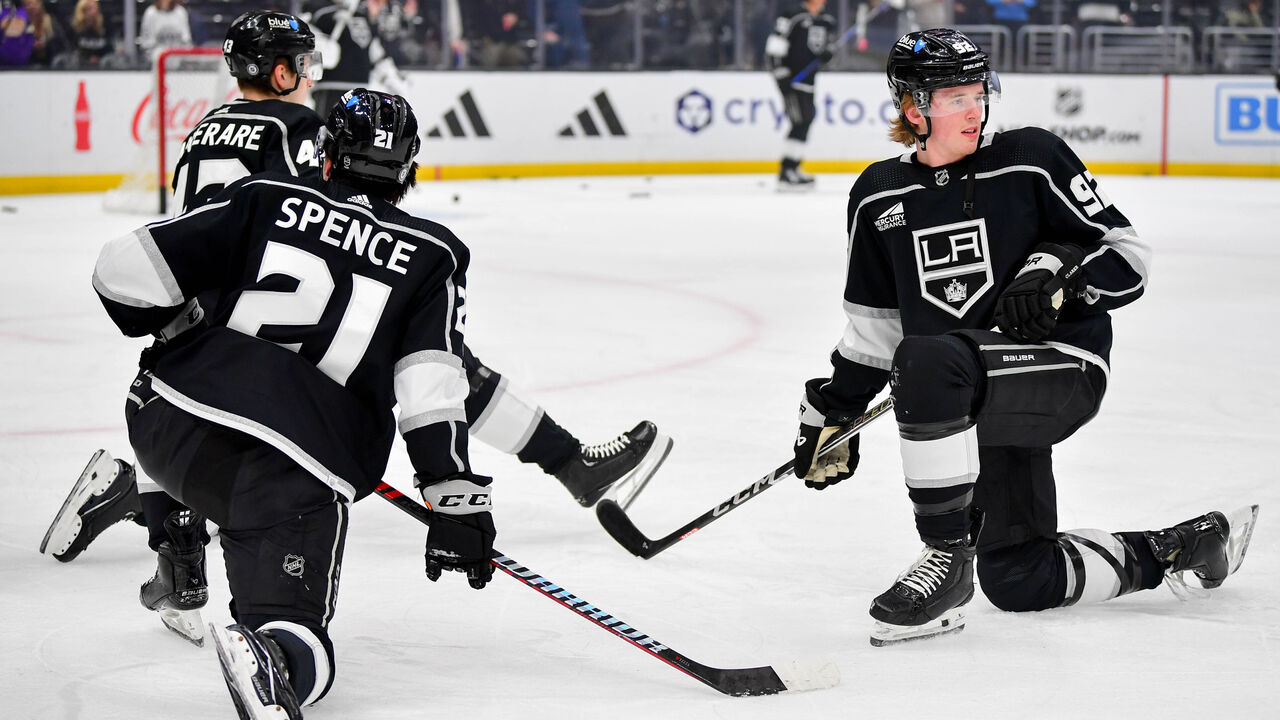Matthews' math on 70 goals, Kings blue-liners, and 4 other NHL items
Poor Felix Sandstrom.
The Philadelphia Flyers goalie thought he had Thursday off but was called into action against the Maple Leafs after Samuel Ersson allowed three goals on 12 shots in the first period. Sandstrom survived the second, plus the opening minutes of the third, before his life flashed before his eyes.
With both Flyers defensemen somehow on one side of the ice, Auston Matthews, the NHL's greatest goal-scorer, accepted a neutral-zone pass:

Matthews entered the Flyers zone on the breakaway, deked, and fired a snap shot from the high slot for goal No. 55. What a haunting sequence for a backup goalie.
Despite scoring only four goals in his past 10 games, Matthews is certain to pass his career high of 60 and is on pace to finish with 70 goals - technically 69.66 - in 81 games (he missed one tilt in mid-December).
The 26-year-old seems to have his third Rocket Richard Trophy locked up. Former teammate Zach Hyman and division rival Sam Reinhart are tied for second with 46 goals while Nathan MacKinnon (42) and David Pastrnak (41) are the only others in the 40s.
Matthews doesn't have a lot of padding in his goal tally, either. He's yet to score an empty-net goal and 40 of his 55 goals have come at even strength. But he creates goals at a far higher rate than expected: Sportlogiq credited him with only 37.1 individual expected goals ahead of the 6-2 win over Philly.

As in years past, Matthews ranks high in many key offensive categories tracked by Sportlogiq. Before Thursday's game, Matthews on a per-game basis ranked first in the league in slot shots (2.76), sixth in inner-slot shots (1.40), first in scoring chances generated off the cycle (2.19), first in chances off the forecheck (0.63), and eighth in chances off the rush (1.14).
It's possible Matthews doesn't dress for all 17 remaining games, given Toronto's comfortably in a playoff spot and needs No. 34 at his best for the postseason. If he does play all 17, the competition isn't particularly overwhelming: Toronto has three games left against New Jersey; two each versus Carolina, Washington, Florida, and Tampa Bay; and one against Philly, Edmonton, Buffalo, Montreal, Pittsburgh, and Detroit.
Matthews has twice this season recorded back-to-back hat tricks; six goals in two games at any point over the final month would go a long way toward reaching 70. Teemu Selanne and Alexander Mogilny - who both scored 76 in 1992-93 - were the last NHLers to reach the mark.
More insight on hockey analytics
My in-depth feature on the NHL's decade of data published Thursday involved interviews with around 20 people. Even though the story stretched to 4,000 words, plenty of interesting insights ended up being edited out.
Here are a few nuggets:
Nugget 1: Expand the time horizon to 15-20 years and you truly get a sense of how much the NHL's changed with respect to access to cutting-edge technology and statistics. Brant Berglund, the Bruins' video coach from 2002-10, recalls popping tapes into a VHS player to scout future opponents. Berglund, now the NHL's senior director of coaching and GM technology, is amazed to see job postings for roles commonly associated with tech start-ups. In 2024, teams have so much data to collect, organize, and analyze that some front offices are hiring database architects and software engineers. What a stark contrast.

Nugget 2: The league's working on the next iteration of NHL Edge, the long-awaited advanced stats hub launched earlier this season. Fans can expect to have access to puck possession, passing, defensive, and special-teams data. The visualizations and sorting filters at NHL Edge will also improve over time. "Part of what we want to do here is present information and allow people to draw their own conclusions from it," said Russell Levine, the group VP of statistics and information. "I think you're going to see much deeper insights as that data set grows and grows more complex."
Nugget 3: OK, this may be surprising: the rise of advanced stats hasn't impacted contract negotiations in any significant way. Games played, time on ice, role, goals, and assists remain the standard talking points, according to one NHLPA agent. Why? Well, only stats on NHL.com can be used in arbitration cases. Negotiations are about the big picture and basic stats often tell a concise story. Teams also have more manpower and access to better data than agencies, so by bringing up advanced stats, the player's side risks "opening Pandora's box" because teams can present more sophisticated data. The agent also stressed that negotiations in the first few days of free agency largely revolve around supply and demand. If a team's desperate, it'll overpay. If a player's desperate, he'll settle for less money or shorter term.
Kings of right-handed D-men

On July 1, 2018, the Kings signed Drew Doughty to an eight-year contract extension. The deal slotted Doughty, then 28, on the right side of Los Angeles' top pair for the foreseeable future, and he remains there today.
Around this time, Matt Roy was beginning to show signs of future top-four potential. He also shoots right. If all went according to plan, the Kings would theoretically have enough talent on the right side to take a conservative approach to right-handed defensemen over the next handful of years.
What they've done instead is acquire righties with NHL potential and then figure out later on what to do with such rare assets. For instance, after the Doughty extension, the Kings signed undrafted free agent Sean Walker and added prospect Sean Durzi in a trade with Toronto.

The Kings then selected seven righties over the next five drafts - not an absurdly high rate but high nonetheless. The kicker is they hit on four of them: Jordan Spence, Brock Faber, Helge Grans, and Brandt Clarke.
Spence and Clarke are future pillars of L.A.'s blue line; Faber and a first-rounder were traded to Minnesota for Kevin Fiala; Grans and Walker left in a three-team, eight-piece swap; and Durzi was sent to Arizona for a second-rounder.
You can certainly quibble with the results of those trades. No major wins.
But the takeaway is that the Kings have continued to covet a hot commodity across the league, which is a clever way of approaching the draft and develop process. It also makes me wonder what's in store for Otto Salin and Matthew Mania, righties with NHL potential drafted by L.A. in 2022 and 2023.
Parting shots
Nasty Nate: The Hart Trophy race will be a treat to watch down the stretch. Matthews, MacKinnon, Connor McDavid, Nikita Kucherov, and Connor Hellebuyck all have strong cases with four weeks left. Here's one stat that isn't necessarily relevant to the MVP discussion but highlights the absurdity of some of these performances: MacKinnon has at least one point in every Avalanche home game. In 32 games at Ball Arena, he's racked up 71 points (26 goals, 45 assists), which is more than all but 18 NHLers' season-long total.
MacKinnon's streak is tied with Guy Lafleur (1978-79, Montreal) for third-longest in league history. Wayne Gretzky - obviously - sits first and second on the list. Gretzky snagged a point in all 40 Kings home games in 1988-89. The modern 82-game season gives MacKinnon one extra date, so he'll become the new record holder if he goes wire to wire.
Nathan MacKinnon's hatty literally just broke Ball Arena... the hats were coming in too hot and took down some wires 🤯 pic.twitter.com/WheLNB6rqL
— B/R Open Ice (@BR_OpenIce) January 25, 2024
Bo and UPL show: While their chances of making the playoffs remain slim (7.8% according to MoneyPuck), the Sabres' recent spurt should be encouraging to fans. Bowen Byram, acquired from Colorado ahead of the trade deadline, has been terrific alongside Rasmus Dahlin on the top pair. The 22-year-old Byram plays an up-tempo, assertive style suited for Buffalo's system. The club's outscored opponents 6-2 in his 70 five-on-five minutes.
Meanwhile, goalie Ukko-Pekka Luukkonen continues to flourish. His .915 save percentage through 42 games ranks in the top 10, and he leads all NHL netminders with a 77% quality start rate, posting a positive goals saved above expected value in 30 of 39 starts. Luukkonen, 25, and Devon Levi, 22, were battling for the starter's job to begin the season, but there's no doubt who the No. 1 guy is now.
Upie earned his fifth shutout AND the sabre tonight! ⚔️#LetsGoBuffalo pic.twitter.com/cwmw235klp
— Buffalo Sabres (@BuffaloSabres) March 15, 2024
RempeMania: The NHL's in the entertainment business, fighting is part of the on-ice product, and dropping the mitts is Matt Rempe's ticket to the NHL. So there should be no mystery why the 6-7, 241-pound Rangers rookie winger's amassed 54 penalty minutes (and a four-game suspension) in 56 minutes of ice time. He's incentivized to fight and is fully committed to the bit.
Hopefully, Rempe is being educated on what this role could do to his long-term health. Brain trauma is no joke. He needs family, friends, the Rangers, and his representatives at KO Sports to be the adults in the room (Rempe is just 21, after all) and lay out the risks and rewards of how he's playing. The kid can contribute offensively in a net-front role, so picking his spots to fight (as in the video below) is a good start.
MacDermid wanted to go but Rempe did not oblige 👀 pic.twitter.com/CZCeKQkhTV
— Gino Hard (@GinoHard_) March 11, 2024
Takes, Thoughts, and Trends is theScore's biweekly hockey grab bag.
John Matisz is theScore's senior NHL writer. Follow John on Twitter (@MatiszJohn) or contact him via email ([email protected]).